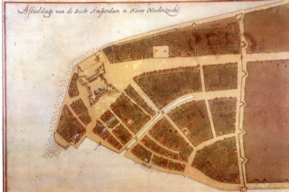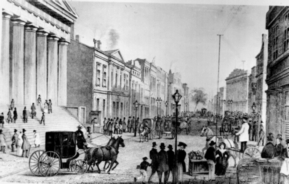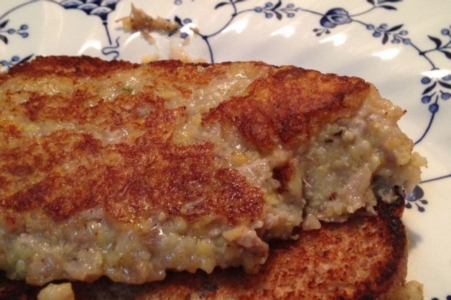Leviticus 172/84: Scrapple Day ... and how did pigs get to America?
So what's Wall Street got to do with pigs - literally? Certainly not as a term of abuse like wolves became, but they are apparently one of the reasons for that name. During the 1600s feral and domesticated pigs commonly destroyed farmers’ crops on Manhattan Island. To stop this [amongst several other reasons including pirates and local tribes myth has it] Dutch farmers in 1653 erected a high wall along the island and the avenue along that wall later became known as Wall Street! [There's a thought for Berlin and The Donald. Way back then the area was a Dutch colony known as New Amsterdam but in 1699 after capture by the British the Wall was taken down. The images show the original plan and Wall Street as it had become by 1867.]
 
But how did the pigs get here, and how did they become such a prevalent part of the livestock business? The long history of domesticated pigs and their important role in society dates back almost 10,000 years. Fossil records show pigs were roaming the earth as early as 40 million years ago and those animals’ descendants are said to have been first domesticated around 7,000 to 9,000 years ago in current day China and parts of western Asia. The Romans later introduced specific breeding for pigs around 3,500 years ago. Though pork consumption was banned in parts of Asia and the Middle East for health then religious reasons western and southern Europeans continued refining pig breeds up to the 1500s. That was when domesticated pigs first set hoof in North American. Christopher Columbus had eight pigs in tow when traveling to Cuba in 1493 after his initial voyage to the New World. But it was his successor Hernando de Soto who is credited with having brought 13 pigs with him when first landing in what is today Tampa Bay, Florida, a baker’s dozen! Raising pigs for food was popular in the 1600s and 1700s in the American Colonies with most farmers owning at least a few that provided food for their families. Any surplus raised was typically sold as barrelled pork preserved with brine. As settlers headed west during the 1700s and 1800s, they took pigs with them. As more pioneer families settled new towns and cities so did pig farms and processing facilities develop. By the mid-1800s as many as 70,000 pigs per day were transported from Ohio — which became a major hub for pork processing and distribution — to the east coast consumers. Later, rail transportation and refrigerated rail cars and trucks took the place of drovers who moved pigs via trails at a pace of less than 10 miles per day.

..all of which brings us to Scrapple Day! Scrapple Day today recognizes the first pork 'food' invented in America. It's traditionally a mush of pork scraps/ offal/ trimmings combined with cornmeal, wheat flour and spices such as sage, thyme, savoury and black pepper. The mush is then formed into a semi-solid loaf for slicing and pan-frying. In Pennsylvania, much in the news as home to President Elect Joe Biden although his grandparents were Irish, the mush has a Dutch name pon haus with the immediate ancestor of scrapple the Low German dish called panhas [maybe The Donald's father knew that one?]. Across parts of Pennsylvania it is still called pannhaas, panhoss, ponhoss, or pannhas. It's a low cost Thanksgiving Meal if you can't get yourself a turkey which was native only to the Americas. Our Christmas' offering [how big this year we keep asking?] was brought back by Spanish traders and was a domesticated species for indigenous Americans.
Avril engages with BT tv on the phone. We were always optimistic that a phone call would set matters right with our new tv box but, after an hour on the phone and BT's denial that my first car was a Green Hillman Imp [it was!], their tele/tv-techicians concluded we had a dud new box and they'd send us another. They've confirmed it's been posted! So we now await the next step … Meanwhile I was burning the gas getting all the now collated papers circulated to 1745 Battle Trustees for Thursday ZOOM. Our next public digital initiative is this coming weekend when on 14th November we'll commemorate the sinking of HMS Fox in a storm off Dunbar; it had given pretty ineffective cannon support to Johnnie Cope at Prestonpans. It'll be modest via streaming on Facebook because no persons are allowed to cross the East Lothian county border presently except for work or medical emergencies - which constrains the Alan Brecks!
Published Date: November 9th 2020
|





